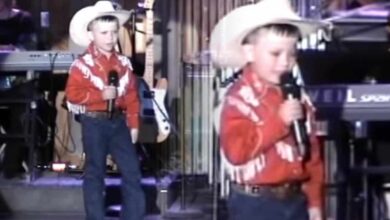Freddy Wrote This Song In 1956, And It Finally Became A Hit In The 70s You Did It, Freddy
Freddy Fender, born Baldemar Garza Huerta on June 4, 1937, in San Benito, Texas, was not just a musician; he was a cultural icon whose life experiences deeply influenced his artistry. Fender grew up in a bilingual environment, absorbing both English and Spanish, which would later play a crucial role in shaping his musical style. His early exposure to music, particularly the sounds of traditional Mexican music and American country, laid the foundation for his unique blend of Tejano and country genres. Throughout his childhood, he faced the challenges of poverty, which ignited in him a fierce determination to overcome the obstacles in his path.
Fender’s initial foray into music began when he was a teenager, playing in local bands while also embracing various musical influences from rock and roll to rhythm and blues. By the late 1950s, he had started to make a name for himself in the music scene, culminating in the release of “Wasted Days and Wasted Nights” in 1959. While the song did not achieve immediate commercial success, it represented a significant moment in Fender’s artistic journey. The heartfelt lyrics and poignant melody highlighted his ability to connect with listeners on an emotional level, a theme that would resonate throughout his career.
However, Fender’s path was not without its challenges. He faced legal issues that would result in a conviction for marijuana possession, leading to a stint in prison. This period could have easily derailed his aspirations, but Fender utilized his time away from the spotlight to reflect on his aspirations and reinforce his passion for music. Upon his release, he found new determination and sought to revive his musical career with renewed vigor. The hardships he faced only deepened the authenticity of his music, allowing him to convey themes of sorrow, love, and resilience.
The early 1970s marked a turning point in Fender’s career as he experienced a renaissance that would establish him as one of the leading voices in the crossover between country and Tejano music. In 1974, his single “Before the Next Teardrop Falls” soared to the top of the charts, solidifying his comeback. This song, characterized by its heartfelt delivery and emotional depth, transcended cultural boundaries, resonating with audiences from diverse backgrounds. With its blend of English and Spanish lyrics, the song cemented Fender’s reputation as a pioneer in his ability to bridge musical worlds.
Fender’s success continued to grow as he revisited “Wasted Days and Wasted Nights” in 1975, infusing it with fresh energy and showcasing his evolution as an artist. The re-released version not only climbed to the top of the Billboard Country chart but also reached No. 8 on the Billboard Hot 100, affirming his position in the mainstream music landscape. This was a remarkable feat for an artist straddling both the country and Tejano genres, a testament to his wide appeal and artistic versatility.
Throughout the late 1970s and 1980s, Fender remained a prominent fixture on concert stages, captivating audiences with his engaging performances and distinguished style. His ability to communicate his life experiences through music resonated deeply with fans, who found solace and connection in his lyrics. Fender’s dedication to his craft inspired a generation of musicians, many of whom acknowledged his influence on their work. His melodies and storytelling prowess not only entertained but also provided a voice for those grappling with similar struggles.
In 2002, Fender’s legacy was honored posthumously with induction into the Texas Country Music Hall of Fame, recognizing his indispensable contributions to the genre. His music continued to flourish, influencing artists long after his passing. Songs such as “Wasted Days and Wasted Nights” and “Before the Next Teardrop Falls” remain timeless classics, celebrated not only for their catchy melodies but also for their poignant storytelling.
Fender’s journey serves as a testament to the resilience of the human spirit and the profound impact of music in overcoming adversity. His ability to weave personal narratives into his songs creates a lasting bond with listeners, who find elements of their own experiences reflected in his work. The emotional weight carried by his music continues to resonate with audiences today, ensuring that his influence endures.
Fender passed away on October 14, 2006, but the songs he created live on, continuing to touch the hearts of fans around the globe. His story, marked by both triumphs and trials, encapsulates the essence of an artist who never gave up on his dreams. Through his music, Freddy Fender carved out a legacy as a beloved figure whose contributions to American music, particularly in the realm of country and Tejano, will forever be cherished.
&ab_channel=MariolaLubera





